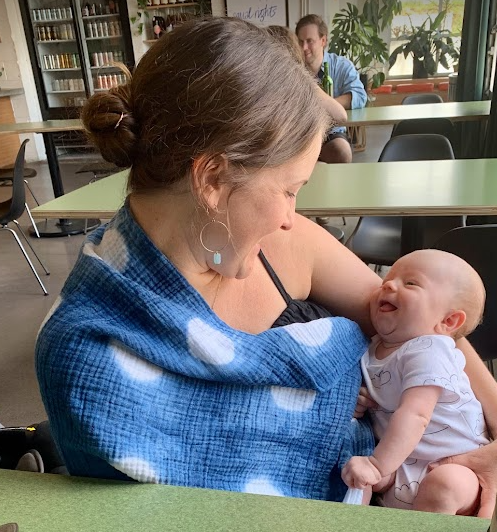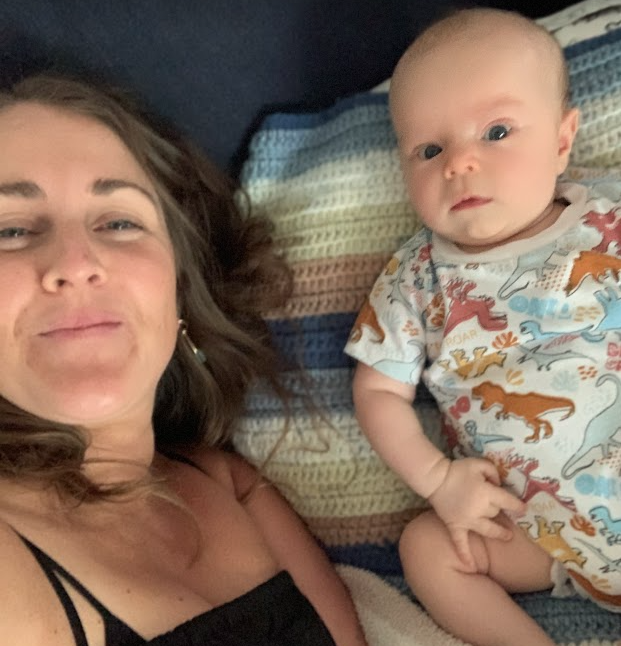Ten Weeks Postpartum
I couldn’t wait to forget
This is all normal.
I repeated it over and over and over again. I even wrote it on a piece of paper and taped it in front of the chair I nursed my son in — along with: There will be coffee. There will be sunshine. Go for a walk. I repeated to myself, It will not stay dark forever. It couldn’t, right?
I had no idea how achingly exhausted I would feel, how lonely being a new mother would be. Even if someone told me, which I’m sure someone did, you don’t understand the pain and complete disorientation until you experience it.
The day we came home from the hospital, the adrenaline of the first 24 hours of parenthood had worn off. My body felt like it had been flattened and then swelled from the destruction. My feet were puffy and a constant sweaty stickiness radiated from my lower half. Legs like tree trunks, I felt like I had elephant appendages. My back and arms ached from labor, from gripping the rails next to the toilet, the hospital bed, and the sink during each contraction. And then there was the learning of football and cradle holds, delicately balancing a new human. My nipples bled and were bruised and blistered. The baby had a tongue tie, and whatever we’d both learned in the first few days would be disrupted by the correction. We’d start all over again. Breastfeeding, no one told me, is the hardest part.
I cried. My husband cried. The baby cried. Everyone cried. Many times from exhaustion, many times for who knows why. Tears fell randomly and constantly. My husband fell asleep on the living room floor one afternoon. I cried at the sight of him. It was the most physically confronting representation of our delirium. The puddle his body made on the rug made me want to melt alongside him. But the baby. The baby was always there. Always needing me.
A girlfriend of mine had her baby exactly one month and a day before me. She texted me that when she and her husband got home from the hospital, they sat on their couch and cried, thinking, What did we do? I thought it was a sweet, vulnerable text as I’d read it at 40 weeks pregnant. Just 15 days later, there we were, sobbing, covered in sweat, tears, and colostrum thinking, What the fuck did we do?!
My brother delivered coffee our first morning at home and tried to console us. “The beginning is hard,” he said. “Don’t worry; you won’t remember how hard this is. It’s how people have more than one kid.” I kept telling my sister-in-law, who came to help us during our first week home, “I can’t wait to forget.”
I wanted to forget the 50 hours of labor. I would try to sleep but would find myself transported back to the delivery room, where just 7 hours before my son was born I thought, I think I’d rather die. I wanted to forget the stitches and the constant bleeding. I wanted to forget wearing adult diapers to contain it.
In the early evenings panic would slowly creep in. I couldn’t help but fear what the darkness would bring. Would he cluster feed all night again? Would the blisters on my nipples get worse? Could they get any worse? I would think of sundowning in nursing homes and how as the sun sets, folks feel confused, anxious, upset. I googled postpartum sundowning.
And then there was the love thing, the mother and baby bond. We didn’t have it. There was an obligation for sure, and it was so much more than responsibility. It was an honor to care for this tiny person — one I was eternally grateful for. But love? Mother to son love? Overwhelming, heart exploding love? Not at all. It was nothing like I expected and yet every mother kept telling me what I felt was normal. But I didn’t feel normal.
Everyone said that there would be a shift. A shift from the surreal nightmare-dream that is having a newborn baby. My sister-in-law said it would happen at a month. My mother-in-law at 8 weeks. My mother told me hers was immediate. I read online that most people start to feel normal at 4 months postpartum. Every time someone gave me their timeline I’d think, Fuck. How am I supposed to wait that long? Every day that passed, that we didn’t bond, made me felt like we were living in an upside down version of our home, sleep deprived and terrified.
The beginning is just so hard. Nothing felt simple, easy. Not even getting dressed. Not even eating. Nothing felt normal. How does anyone do this?! I asked myself daily. And yet we all do. The first 8 weeks, I thought I wasn't gonna make it. Nothing felt instinctual, or at least I couldn’t hear my instinct above my tears and lack of confidence. But then at 10 weeks, suddenly, it did indeed shift — like a bomb exploded in my living room, but left everything perfectly intact. I realized I loved him. Mad love. Insane love. Finally, we bonded.
There are things no one told me, or maybe my naïve single self didn’t know how to absorb the information long enough to remember it. In the beginning, I didn’t want to remember, but looking back, eight months later, these are things I want to:
Time is a concept. It’s irrelevant. It moves painfully slow and achingly fast. You once thought waking up at 5AM to walk around the block wearing your pajamas would be only in your nightmares and yet doing so was your saving grace.
Drinking a beer made you feel normal again. As did unloading the dishwasher. The simplest everyday tasks brought you back to reality, even if only for a moment.
Laughter is medicine. Your husband nicknamed you Titty City, the mayor actually. It was absurd and everything you needed. You almost ripped your stitches and peed your pants, and maybe you did a little bit, when your husband and his sister chanted MELK around the house one afternoon.
Movement is medicine too. And going outside. Feeling the warm sun on your body reminded you, you are *actually* alive.
As are showers, hot ones and cold ones. You once loathed a shower and now it’s your cherished alone time, every day.
Nothing anyone says is all that reassuring. But keep trying to believe them. Because even though you don’t, most of them are right. And parenting is playing the long game.
You aren’t alone, and you never were. From the moment you became pregnant, an entire community of mothers, many of whom you were already friends with, became so full of depth, a depth you never knew existed. But you know now, and now every mother on the planet is your sage and confidant.
Music helps. But listen to your birth playlist with caution. Every song feels different.
And at six weeks postpartum, when your sister-in-law asked how it was going. “Are you feeling more like yourself?” she asked. “I feel like I’m part old me, part new me, and somewhere in between,” I told her. “Welcome to motherhood,” she responded.
Part old-me always. Postpartum forever. Mother.

